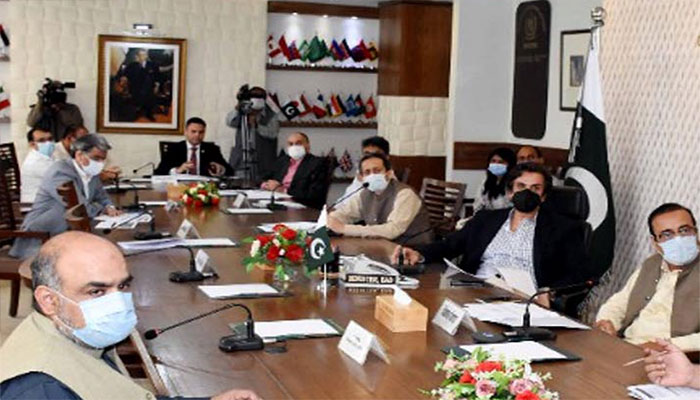‘Half of $3.1bln development projects in Sindh facing delays’
ISLAMABAD: Half of 27 foreign-funded projects in Sindh are facing implantation challenges and feared to be shelved if not completed on time, officials said on Thursday.
The meeting of National Coordination Committee on foreign-funded projects in Sindh was told 27 projects amounting to $3.1 billion in communications, transport, energy, water and irrigation, education, health and public private partnership with the support of development partners including Asian Development Bank and World Bank are under implementation.
The Karachi Mobility, Sindh agricultural growth, and Sindh response to stunning projects are problematic and facing huge challenges in course of implementation, it was told. Out of 27 foreign-funded projects, 14 projects have been ranked as problematic and unsatisfactory, according to the officials.
The meeting was chaired by the Minister for Economic Affairs Khusro Bakhtyar. Planning Commission Deputy Chairman Jahanzeb Khan, Secretary Economic Affairs Division Noor Ahmed, and the provincial government representatives attended the meeting.
It was told that the development partners expressed their ‘serious’ concerns on slow implementation of the projects from time-to-time. Some of the projects may lapse foreign funding if not utilised within stipulated timelines.
The minister expressed displeasure to the line departments of Sindh government for slow implementation of foreign-funded projects in the province.
“These projects are significant to achieve the SDGs (sustainable development goals) in the country, so there is dire need to put them on fast track,” he said.
Bakhtyar also directed the line departments to indicate timelines for resolution of impediments and expedite the completion of these projects of public importance. Projects related to stunt growth and agricultural sector must be executed in timely and efficient manner, he said.
In a latest evaluation report, Asian Development Bank (ADB) expressed concern over weakening performance of Pakistan in implementation of ADB-funded projects.
“Pakistan’s project performance dropped to 58 percent in 2018–2020 from 70 percent in 2017–2019 due to poor performance in the public sector management and water sectors,” it said, citing inadequate project ownership and commitment, weak implementation capacity, and substantial implementation delays and cost overruns as reasons.
“The challenging political environment and a succession of boom-and-bust economic cycles have hampered Pakistan’s development progress.”
ADB said the capacity building could avert delays in project implementation. “In an urban and sanitation sector investment program in Pakistan, for example, the risk of losing government interest in a key policy reform component (the devolution of governance to regional urban service institutions) could have been reduced had the project design included components to strengthen the role and capacity of the provincial government in urban policy and planning (through the regional urban unit) with a sharp focus on the coordination role of the respective provincial line departments (through program support unit) and on the capacity building of local governments (through municipal administrations),” it said.
-
 Jennifer Aniston Already Decided Her Wedding Dress?
Jennifer Aniston Already Decided Her Wedding Dress? -
 Prince Harry, Meghan’s Hollywood Party Drama Exposes Chaotic PR Strategy
Prince Harry, Meghan’s Hollywood Party Drama Exposes Chaotic PR Strategy -
 Jennifer Garner Reacts To Savannah Guthrie's Video As Search For Nancy Guthrie Continues
Jennifer Garner Reacts To Savannah Guthrie's Video As Search For Nancy Guthrie Continues -
 Bad Bunny Leaves Fans Worried With Major Move After Super Bowl Halftime Show
Bad Bunny Leaves Fans Worried With Major Move After Super Bowl Halftime Show -
 Captain Jason Talks Personal Hardships He Faced Ahead Of 'Below Deck' Season 4
Captain Jason Talks Personal Hardships He Faced Ahead Of 'Below Deck' Season 4 -
 Anti-monarchy Group Reacts To Prince William, Kate Middleton Statement On Epstein Scandal
Anti-monarchy Group Reacts To Prince William, Kate Middleton Statement On Epstein Scandal -
 Andrew 'must' Apologize Not Wider Royal Family For Jeffrey Epstein Links
Andrew 'must' Apologize Not Wider Royal Family For Jeffrey Epstein Links -
 Super Bowl 2026: Why Didn't Epstein Survivors Ad Air On TV?
Super Bowl 2026: Why Didn't Epstein Survivors Ad Air On TV? -
 'Harry Potter' TV Series Exec Teases 'biggest Event In Streaming': Deets
'Harry Potter' TV Series Exec Teases 'biggest Event In Streaming': Deets -
 Camila Mendes Finally Reveals Wedding Plans With Fiancé Rudy Mancuso
Camila Mendes Finally Reveals Wedding Plans With Fiancé Rudy Mancuso -
 Beatrice, Eugenie Blindsided By Extent Of Sarah Ferguson’s Epstein Links
Beatrice, Eugenie Blindsided By Extent Of Sarah Ferguson’s Epstein Links -
 Girl And Grandfather Attacked In Knife Assault Outside Los Angeles Home
Girl And Grandfather Attacked In Knife Assault Outside Los Angeles Home -
 Super Bowl Halftime Show 2026: What Did Trump Say About Bad Bunny?
Super Bowl Halftime Show 2026: What Did Trump Say About Bad Bunny? -
 Piers Morgan Defends Bad Bunny's Super Bowl Performance, Disagrees With Trump Remarks
Piers Morgan Defends Bad Bunny's Super Bowl Performance, Disagrees With Trump Remarks -
 Andrew Lands In New Trouble Days After Royal Lodge Eviction
Andrew Lands In New Trouble Days After Royal Lodge Eviction -
 Instagram, YouTube Addiction Case Trial Kicks Off In California
Instagram, YouTube Addiction Case Trial Kicks Off In California




